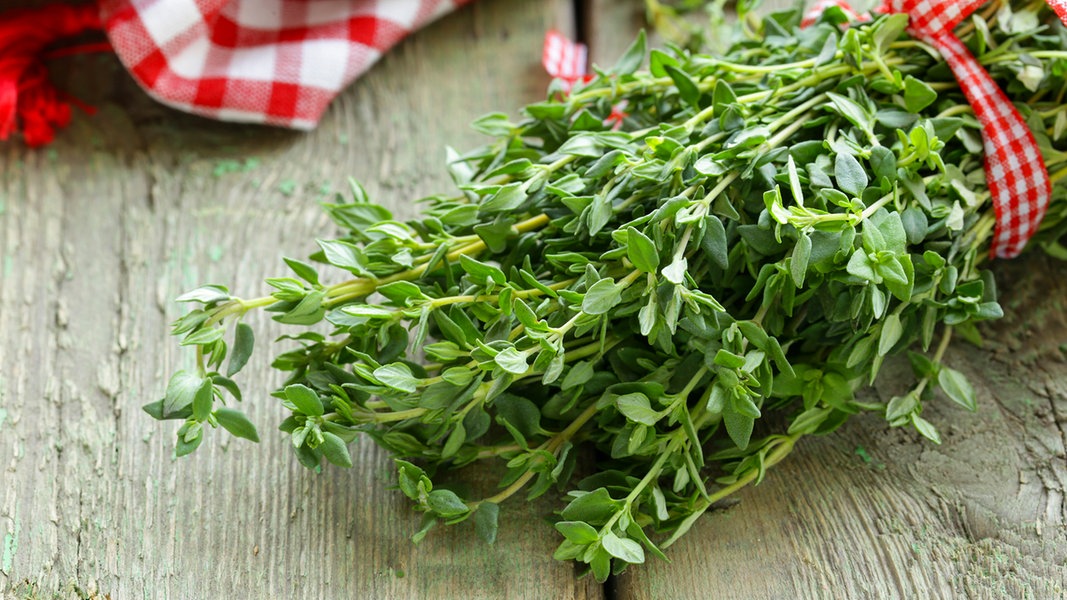As of: April 24, 2024 5:34 p.m
Particularly in Mediterranean cuisine, thyme adds flavor to meat, fish and vegetable dishes. The herb is also popular as a tea. There are different varieties. What makes them different?
The herb with small leaves has an intensely spicy aroma that goes well with many dishes. It can be used both fresh and dried and refines fish and meat as well as pasta, pizza, soups and salads. Thyme is ideal for seasoning potatoes, mushrooms and Mediterranean vegetables such as peppers, tomatoes, zucchini and aubergines and is an integral part of herb mixtures such as bouquet garni or herbs de Provence.
Which type of thyme for which dish?
Thyme is a typical ingredient in Mediterranean cuisine. It also gives many desserts a special aroma.
There are more than 100 different varieties of thyme, the best known being the so-called real thyme (Thymus vulgaris). Although all varieties can be used similarly, some varieties are particularly suitable for certain dishes.
For example, lemon thyme (Thymus citriodorus) with its fine lemon note is ideal for seasoning poultry and fish, but also gives sweet dishes such as lemon cake or vanilla pudding a fresh aroma. Orange thyme also has a fruity note that goes well with sweets. Both varieties are also very suitable as tea when dried. Field thyme (Thymus serpyllum), also known as sand thyme, wild thyme or thyme, is somewhat milder and tastes delicious, for example, in rustic stews and potato dishes or with soft cheese.
Further information
Refined: The herbs give the cake a nice aroma, and the zucchini make it nice and juicy. Recipe
A fine summer appetizer. The vegetable strips are filled with mozzarella and Parma ham and baked. Recipe
An unusual soup creation by Thorsten Schumacher: carrots meet beer, orange juice and cream. Recipe
Cooking and baking with thyme
Fresh thyme is in season from approximately May to September, and is also available in pots or bunches all year round. Rinse the fresh branches briefly and shake them dry or pat them dry carefully with kitchen paper. Remove the small leaves from the hard stems and cut into small pieces. Alternatively, you can simply cook whole stems and take them out later. For example, if you want to add thyme to a cake, you can grind the leaves with flour in a food processor or finely crush them with a mortar.
Dried thyme has a stronger flavor than the fresh leaves: it is available commercially in both crushed and ground form. Important: It’s best to add thyme to the dish at the beginning and cook it too, as the heat allows it to develop its full aroma.
Plant thyme in the garden or on the balcony
Thyme loves warmth and thrives best in a sunny spot in the garden.
If you want to plant thyme yourself, you should choose a dry, sunny location if possible. The plant is only partially hardy; it usually cannot survive longer periods of frost. The herb is best harvested shortly before flowering, then it contains the most essential oils and tastes most intense. You can still harvest thyme afterwards, but it will no longer be as aromatic.
The fresh branches can also be dried for later use. The best way to do this is to tie them into bouquets and hang them upside down in a dark, dry room. When the bunches have dried, pluck the leaves from the stems and put them in a well-sealed container. If stored in a dark and cool place, thyme will last for several months.
Thyme tea: Effective for coughs and digestive problems
Thyme is also used as a medicinal herb. Thyme tea relieves the urge to cough when you have a sore throat and has a digestive and antispasmodic effect. It also has a positive effect on the immune system.
Further information
Thyme is a versatile medicinal plant: It has a strengthening effect and helps with cold symptoms, among other things. more
Thyme tea for coughs, chamomile ointment for the skin: medicinal plants from the garden can relieve symptoms. more
Herbs in the garden or on the balcony need different locations. Which ones do parsley, rosemary, etc. need? more
This topic in the program:
Tastes. Always. | May 5, 2024 | 4:30 p.m
